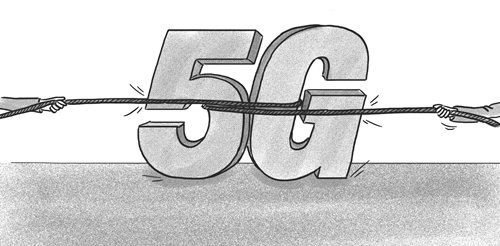HOME >> BUSINESS
US should not bring confrontation to 5G technology that requires connectivity
By Toumert AI Source:Global Times Published: 2019/6/23 22:33:47

Illustration: Xia Qing/GT
There is currently a heated discussion within the international media and governments around the globe regarding the 5G network. The increasing pressure is reflected by the fact that the cold war mentality is reappearing through the language of some developed nations in their defensive stand against the right of developing nations to be part of the fifth industrial revolution not as mere consumers, but as solution providers with know-how, skills and available proven technology.
This leads us to the question of why the US administration is aggressively drawing negative attention throughout the world and especially its allies to the next 5G network. The trade dispute with its main economic rival, China, is being presented as part of a national security issue related to the next generation technology that Huawei is introducing. However, this is widely seen as an attempt to exclude Huawei from any future trade deals.
There is however, the possibility that the issue is not trade at all, and if it is not, why is the US government depicting the 5G network as a national security issue?
In order to better understand America's antagonistic stance, we have to understand the 5G network beyond the speed by which we will be able to send information. Although the new network we will be able to speed up our connectivity from a 100 megabytes per second to an astonishing 25 gigabytes per second once it is fully developed, it has far great implications for the global economy.
The 5G network is the gateway to the fifth industrial revolution. It is the cyber infrastructure needed to connect the fourth industrial revolution' progress in robotics, AI and machine learning to the next economic level.
It will enable the establishment of a complex web where everything is automated from production to delivery. It will be the catalyst for the evolution of the Internet of Things (IoT), and result in the full integration of smart devices, smart cities, smart mobility and smart governance; all of them interconnected, placing us at the forefront of what experts are calling Industry 4.0
Any nation without the 5G network will not fully benefit from the potential behind robotics, AI, and quantum computing, neither will they be able to participate in the new economic era.
Figures gathered from different research studies around the globe estimate that the value of production output will reach approximately $12 trillion by 2035 due to use of 5G technology.
Low latency will be the game changer, and the nations that have developed their IoT infrastructure and managed to link them to each others will be the ones that will lead the 21st century's economic and social drive.
The 5G network has to be seen as an ecosystem, the new form of globalization. Once all economies are integrated to the 5G network, decision-making will be much easier, once IoT devices are connected at a global level, the question of supply and demand will change dramatically. Business performances will see new highs, and policymakers can have almost instant data and projections to make informed decisions.
This leads us to reflect on the impact of this new network on our way of life, doing business and interacting with each other.
Once it is launched, the world is going to be different.
With more than 20 billion IoT devices deployed worldwide by the end of 2020, our ways of producing, purchasing, communicating and connecting will change forever.
This will be the 5G impact. How do we proceed from now on is the issue at hand.
We are arriving at the point of singularity, where technology, especially AI and IoT, will be in control in every household, business, and institution.
And the fact that the US is bringing 5G into the trade dispute with China, leaves us with a new reality: technological disruption is a fact, the traditional confrontations between nations have moved to cyber space, and the next industrial revolution is putting developing nations like China at the same starting point as any developed nation.
The fifth industrial revolution is irreversible, we are connected, whether we like it or not, to the same cyber infrastructure, and we can choose to either be informed by the mentality of last century's industrial revolutions and politics, and build cyber space walls around us; or we embrace this new found connectivity and find a middle ground, a new dogma in international relations and the digital economy based on cyber sovereignty, so we can be able to create a shared technological and economic environment where innovation and entrepreneurship are the key competitive advantages.
The author is director of Education, International Bachelor Program at the International School under the China Foreign Affairs University. bizopinion@globaltimes.com.cn
Posted in: EXPERT ASSESSMENT